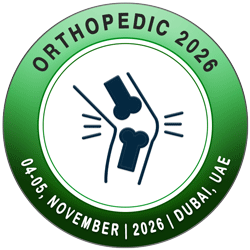Track: Orthopedics and Arthroscopy

Orthopedics is the branch of medicine concerned with diagnosing, treating, and preventing musculoskeletal disorders, including injuries and diseases affecting the bones, joints, muscles, ligaments, and tendons. Arthroscopy is a minimally invasive surgical technique used in orthopedics to diagnose and treat joint problems, often involving the knee, shoulder, elbow, hip, or wrist.
Key Topics and Highlights:
Arthroscopic Techniques: Procedures that allow for the examination and treatment of joint problems through small incisions using a camera (arthroscope) and specialized instruments.
Knee Arthroscopy: Commonly used to treat injuries to the meniscus, ligaments, and cartilage, including repairs or removal of damaged tissue.
Shoulder Arthroscopy: A minimally invasive procedure to treat rotator cuff injuries, shoulder impingement, or labral tears by cleaning, repairing, or reattaching tissue.
Hip and Elbow Arthroscopy: Treatment options for joint problems such as labral tears, joint inflammation, or cartilage damage in the hip and elbow, allowing for reduced recovery time.
Benefits of Arthroscopic Surgery: Reduced recovery times, smaller incisions, lower risk of infection, and faster return to activity compared to traditional open surgeries.
Summary:
This session will focus on the key concepts and advancements in orthopedic arthroscopy, highlighting its growing role in the diagnosis and treatment of various joint conditions. Experts will discuss the use of arthroscopy in knee, shoulder, hip, and elbow surgeries, emphasizing the benefits of minimally invasive techniques. Attendees will gain insight into the latest arthroscopic procedures for repairing damaged tissue, addressing injuries, and enhancing recovery times. The session will also explore post-surgical rehabilitation strategies that are critical for achieving optimal outcomes.
Scientific Highlights
- Orthopedic Surgery
- Orthopedics and Sports medicine
- Orthopedics and Arthroscopy
- Orthopedic Physiotherapy
- AI and Robotics in Orthopedics
- Arthritis: Types, Diagnosis and Treatment
- Arthoplasty and Oncology
- Musculoskeletal Disorders, Medical and Clinical Trials
- Rheumatology and Arthritis
- Foot & Ankle Surgery
- Spine Disorders and Surgery
- Physical Medicine and Rehabilitation
- Neurology and Orthopedic surgery
- Orthopedic Radiology
- Orthopedics and Osteoporosis
- Other Orthopedic Trauma: Surgery and Conditions


